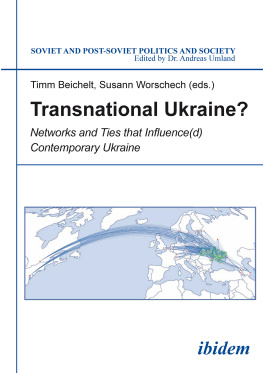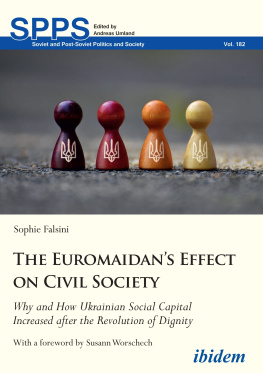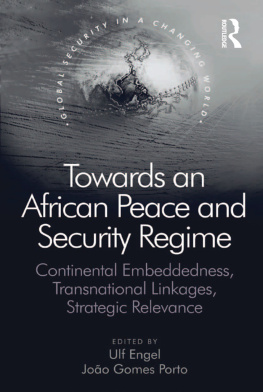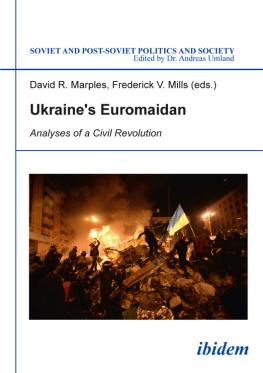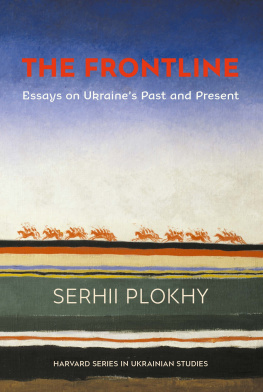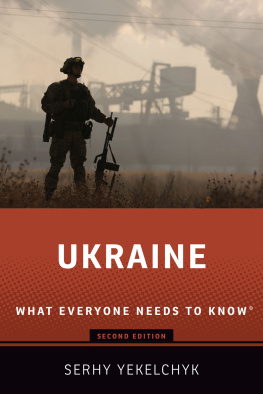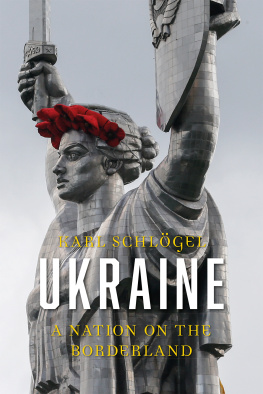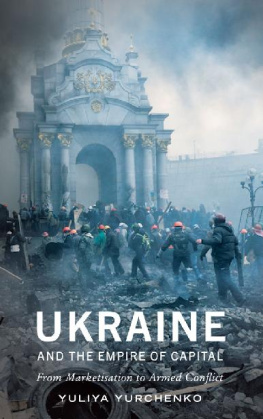This book arose from a c onference in November 2015 that was based on a challenging idea. Only shortly after the Euromaidan protests, the annexation of Crimea, the start of the war in Eastern Ukraine, scholars from various disciplines gathered at European University Viadrina in Frankfurt (Oder), just a few steps away from the German-Polish border. Against this scenery of a symbolically charged border, about twentyfive scholars discussed how to conceptualize and analyze contemporary Ukraine. Our ambition was to acknowledge the huge and courageous societal change within that country, but also to include the multifold and ambivalent external links of a space that by definition seems to be a borderland: .
In this context, the idea was born to edit some of the papers presented at the conference under the heading "Transnational Ukraine". We chose transnationalism as an analytical starting point because of a core research area at European University Viadrina on the interplay of borders and orders in contemporary Europe ( https://www.borders-in-motion.de/ ). Transnationalist perspectives seem to be appropriate in constellations in which nation states and their borders retain importance, but are challenged and transgressed by actors, practices, and ideas. The conference led us to the insight that Ukraine represents a paradigmatic case when thinking about the porosity of borders in a world where some actors have more powers or resources than others to question these borders.
The conference was co-financed by the German Association for East European Studies and European University Viadrina. We like to thank both institutions greatly for having facilitated that debate. In particular, we want to express our special thanks to Ulrike Sapper and Gabriele Freitag for their excellent preparation and organization of the conference. We really enjoyed this great cooperation.
Further, we would like to thank Karoline Winter for her wonderful and diligent support in preparing the manuscript. Also, we would like to thank Maria Ugoljew for helping us to deploy a correct and coherent transliteration. Special thanks go to the editorial team at ibidem , in particular to the editor Andreas Umland and to Valerie Lange who steered us through the publication process.
List of Contributors
Timm Beichelt is a professor for European Studies at European University Viadrina. His research interests are related to regime developments in countries of Eastern, Central, and Western Europe. Among many other trips to Ukraine, he has undertaken a series of scientific field trips which are documented in a blog ( https://viadrinagoesukraine.wordpress.com/ ). Recent publications cover German European policy, Civil Society and Democracy Promotion in Eastern Europe, and Legitimate Authoritarianism in Russia.
Veronika Borysenko is a master student of the program " European Studies " at European University Viadrina, Germany . She holds a bachelor ' s and master ' s degree in I nternational R elations from Kyiv Natio nal Taras Shevchenko University. Since 2016 she is w orking as Project Assistant in European Exchange within the project European Platform for Democratic Elections. Her main areas of research interests are political developments in P ost- S oviet countries and democracy support for countries in transition.
Mascha Brammer obtained her BA in Social Science and Literature Studies from the University of Erfurt. She is currently enrolled in the MA European Studies at European University Viadrina in Frankfurt/Oder. During her studies she spent two semesters at the Bosphorus University, Istanbul and gained working experience at the German Bundestag, a political youth education program and several NGOs.
Dr Alexander Clarkson is Lecturer for Germ an and European Studies at King' s College London. He holds a PhD in Modern History (University of Oxford). His research focuses on the politics of i mmigrant communities including the Ukrainian diaspora, the impact of immigration on German society as well as Euro pean security. He is author of Fragmented Fatherland: Immigration and Cold War Conflict in the Federal Republic of Germany (2013).
Jonas Eichhorn is a master student of the program Culture and History of Central and Eastern Europe at the European University Viadrina in Frankfurt (Oder) and at Charles University in Prague . Previously, he studied Slavic Studies and H istory in Heidelberg and St. Petersburg . Jonas Eichhorn was as a volunteer for Action Reconciliation Service for Peace and worked in the archive of Memorial in Moscow for one year. He holds a scholarship of the Heinrich Bll Foundation .
Dr Andr Hrtel (born in 1979) currently works a s DAAD Associate Professor for German and European Studies at the National University Kyiv-Mohyla Academy in Ukraine. Before , he has been Political Advisor at the Council of Europe ' s Directorate of Policy Planning (Strasbourg, France) and a Lecturer in International Relations at Friedrich-Schiller-University Jena, Germany. He was educated in Political Science and International Relations at Friedrich-Schiller-University Jena, the University of Virginia (US) and Oxford Brookes University (UK). Aside from being a regional specialist for the Post-Soviet space his research interests cover foreign policy analysis, international organizations, democratization, and state-building.
Andriy Korniychuk is an A nalyst in European, Migration Policy, Democracy and Civil Society Programs at the Institute of Public Affairs (Warsaw, Poland). He graduated in European Public Affairs (M.A.) from Maastricht University and Society and Politics from Lancaster University/Centre for Social Sciences (M.A.). Currently , he is doing his doctoral research as a memb er of the European Studies Unit at the Graduate School of Social Research of the Institute of Philosophy and Sociology of the Polish Academy of Sciences (research area: democratic legitimacy bey ond nation-state, case of EU).
Mikhail (Mykhailo) Minakov is an Associate Professor of the Department of Philosophy and Religious Studies of the National University of Kyiv-Mohyla Academy (Ukraine) and Editor-in-Chief of the Ideology and Politics Journal. He graduated in Philosophy (M.A.) from Kiev-Mohyla Academy, defended his Candidate (2000) and Doctoral (2007) dissertations at the Kiev Institute of Philosophy. Mikhail's main interest is dedicated to political modernization, theories and practices of revolutions, political imagination and ideologies.
Magdalena Patalong is Research Assistant at the Institut fr Europische Politik (IEP) Berlin. She studied political science at the Ludwig-Maximilians-University in Munich and Eastern European Studies at the Free University of Berlin. Magdalena Patalong's academic focus includes civil society and think tanks in Ukraine, the Eastern Partnership and EU-Russia Relations.
He iko Pleines is head of the Department of Politics and Economics, Research Centre for East Europe an Studies and Professor of Comparative Politics at the Univer sity of Bremen. He has been con ducting research on the political role of Ukrainian oligarchs since 2004, leading to n umerous publications.
Simo n Schlegel obtained his PhD in S ocial A nthropology from the Martin Luther University in Halle, Germany in 2016. His doctoral research was funded by the Max Planck Institute for Social Anthropology, where Simon Schlegel is part of the research group Historical Anthropology in Eurasia . His thesis is based on fifteen months of fieldwork in rural south-western Ukraine during which he experimented with combining research methods from ethnography and historiography. His main research interests are the P ost- S ocialist transition, new forms of nationalism, clientelism, and emerging civil societies. He currently teaches social anthropology at the Martin Luther University.

